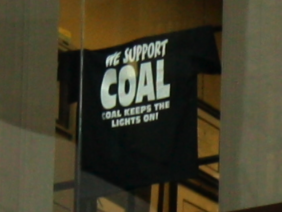This is cross-posted from huffington post.
While the US Senate Committee on Environment and Public Works is charged with protecting “the air we breathe, the water we drink, and the products we consume have a direct impact on the health of our families,” some of its staffers apparently feel it should also serve as a front for the devastating pollution of Big Coal.
As hundreds of citizens from ravaged coalfield areas in Appalachia and around the nation fill the corridors of Congress this week, calling on the House and Senate to pass the Clean Water Protection Act/Appalachian Restoration Act to stop the illegal dumping of toxic coal waste into our American waterways, Sen. James Inhofe (R-OK) and his staff on the Senate Environment and Public Works Committee are reportedly providing free window space for Big Coal ads in our taxpayer financed federal buildings.
Check out this photo of the Senate minority leader’s office window at the E/PW Committee, sent by concerned coalfield residents from West Virginia, who have repeatedly asked the staffers to take down the offensive T-shirt on government property:


While Sen. James Inhofe’s comments on climate change are legendary, his prairie land and plains state support for flattening Appalachia through devastating mountaintop removal mining is dangerously uniformed. Last spring, Inhofe sent a letter to EPA chief Lisa Jackson, charging her agency for delay in issuing Clean Water Act permits. Inhofe erroneously claimed:
“As you know, mountaintop mining is a vitally important economic activity. It provides a significant portion of the coal that contributes nearly 50 percent of the nation’s electricity. It also provides well-paying jobs and revenues for some of the neediest regions.”
Significant portion of coal?
Setting aside the reality that mountaintop removal’s irreversible destruction has eliminated over 500 mountains and nearly 1.2 million acres of hardwood forests in the carbon sink of America, led to the largest forced removal of American citizens since the 19th century, and jammed an estimated 2,000 miles of headwater streams and waterways with toxic coal waste, Inhofe’s distortion of the true cost of coal and his window dressing for Big Coal overlooks four main points:
1) As everyone else on the Senate Environment and Public Works Committee does know–or should know– mountaintop removal mining provides less than 8 percent of all national coal production.
2) Mountaintop removal has bled the Appalachian economy and job market. As the recent study, “The Decline of Central Appalachian Coal and the Need for Economic Diversification,” makes clear:
Despite these economic benefits, coal-producing counties in Central Appalachia continue to have some of the highest poverty and unemployment rates in the region, and due to the dependence on coal for economic development, any changes in coal production will have significant impacts on local economies.
Specifically, a study last year by West Virginia University reseachers found:
The coal industry generates a little more than $8 billion a year in economic benefits for the Appalachian region. But, they put the value of premature deaths attributable to the mining industry across the Appalachian coalfields at — by a most conservative estimate — $42 billion.
And check out West Virginia blogger Clem Guttata’s analysis of the economics of mountaintop removal on the heels of Inhofe’s misinformed comments.
3) Even the most pro-coal legislators in Appalachia and on Capitol Hill recognize that Appalachian coalfields and across the country are facing a clock of peak coal, and need to shift toward a just transition for clean energy jobs and economic development.
4) Sorry Sen. Inhofe: Coal-fired plants provided only 45% of our electricity last year, and it’s declining.
You can let Sen. Inhofe and the Senate Committee on Environment and Public Works, as well as all members of Congress, know what you think about public financing for Big Coal and misinformation here.

 If President Obama is right and the U.S. is facing a new
If President Obama is right and the U.S. is facing a new  As the oil continues to spill into the gulf and BP attempts to cap the well with an operation known as a “top kill,” shocking details about the inner workings of the US Minerals Management Service and their relationship with the oil industry have come to light.
As the oil continues to spill into the gulf and BP attempts to cap the well with an operation known as a “top kill,” shocking details about the inner workings of the US Minerals Management Service and their relationship with the oil industry have come to light. 

